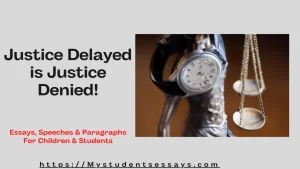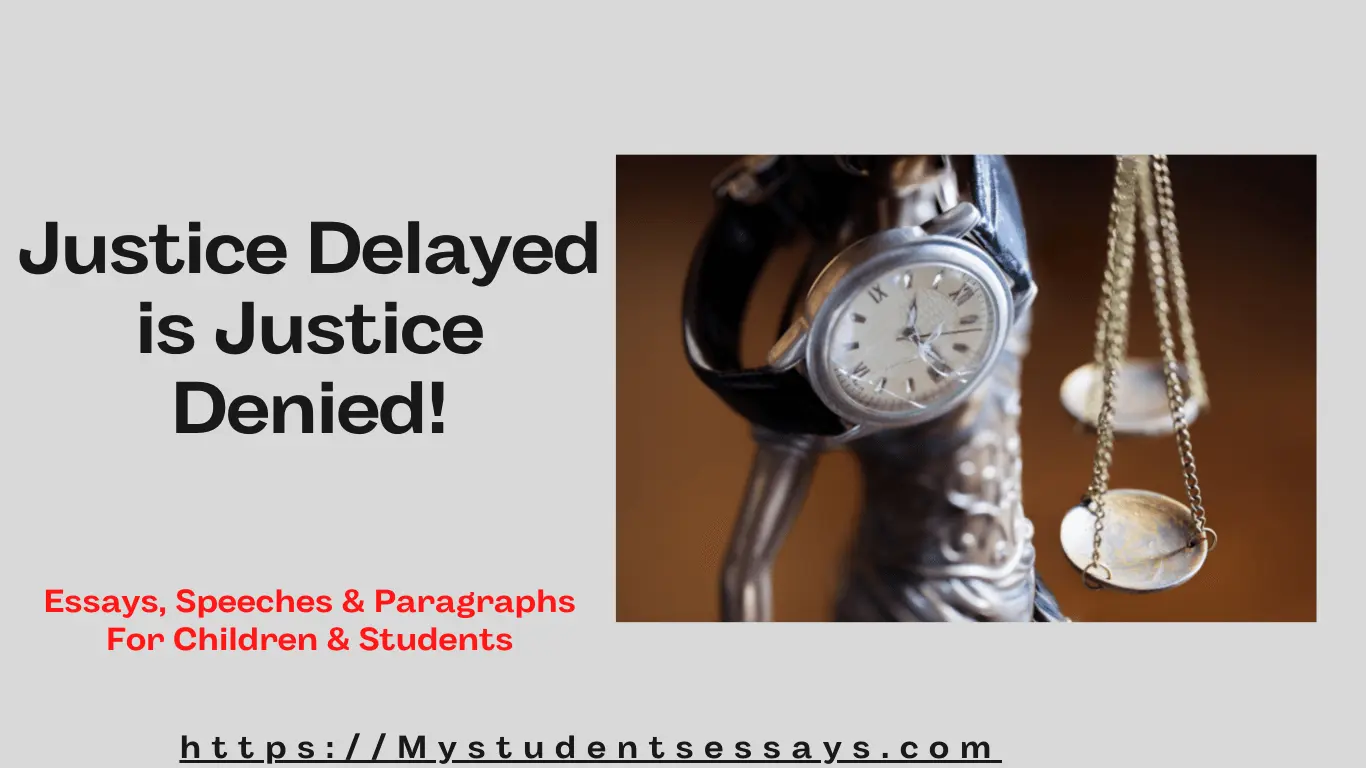Justice and fairness is the key criterion for a progressive and developing human civilization. A place where justice is delayed without specific reasons is tantamount to denial of Justice. The delay and lingering in execution of justice reduces the significance of justice and integrity in society. The following Essay on Justice Delayed is Justice Denied talks about the very meaning and concept, why speedy justice is necessary and how justice is denied etc. This Essay is very helpful for children and students in school exams and written tests etc.
Justice Delayed is Justice Denied Essay for Students
Justice delayed is justice denied. This phrase is often used to describe the negative consequences of delayed justice. When people are not given a timely response to their grievances, they may feel that they have been wronged and that the system has failed them. Delayed justice can lead to frustration, anger, and even violence. In this essay, I will explore the meaning of this phrase and discuss some of the ways in which delayed justice can impact people’s lives.

The phrase “justice delayed is justice denied” has been used for centuries. It was first used by the English philosopher and jurist Sir Edward Coke in the early 1600s. Coke was writing about the right to a speedy trial, but his words are just as relevant today. In a society where justice is often slow, people can feel that they are powerless and that the system is against them.
>>> Related Post: “ Essay on Students Politics”
Why Swift Justice is Necessary?
Fair and speedy justice is a cornerstone of any society that values the rule of law. When people feel that they can get a fair hearing in a timely manner, they are more likely to trust the government and its institutions. Delayed justice, on the other hand, can lead to frustration and even violence. In some cases, it can also lead to a loss of faith in the justice system.
There are many reasons why justice should be swift. One of the most important is that it helps to maintain order in society. When people feel that they have been wronged and that the system is not working for them, they may take matters into their own hands. This can lead to vigilante justice, which is often more brutal and less effective than the justice that is dispensed by the government.
Another reason why swift justice is important is that it helps to ensure that innocent people are not convicted of crimes they did not commit. If a person is accused of a crime and has to wait months or even years for their day in court, they may be tempted to plead guilty just to get the process over with. This can have devastating consequences for the accused and their families.
How Justice is Delayed?
There are many reasons why justice can be delayed. Sometimes it takes a long time to gather evidence or to conduct a trial. In other cases, the system may be backlogged with cases. Whatever the reason, delayed justice can have a negative impact on people’s lives.
One of the most obvious impacts of delayed justice is frustration. When people have to wait a long time for a response to their grievance, they may feel angry and frustrated. This can lead to violence and chaos.
In some cases, people may even take the law into their own hands and seek revenge.
Delayed justice can also have a psychological impact on people. When people feel that they have been wronged and that the system has failed them, it can lead to feelings of powerlessness and despair. In extreme cases, this can even lead to suicide.
Delayed justice can also lead to corruption. When people have to wait a long time for a trial, they may be tempted to bribe judges or lawyers in order to get a favorable outcome. This can lead to an unfair justice system and undermine the rule of law.
Conclusion
In conclusion, delayed justice is justice denied. It can lead to frustration, anger, and violence. It can also have a psychological impact on people, and it can lead to corruption. The only way to avoid these negative consequences is to ensure that justice is swift and fair.
Short Essay on Justice Delayed is Justice Denied:
Justice delayed is justice denied is a phrase that means when justice is not served in a timely manner, it loses its purpose and meaning. It highlights the importance of timely delivery of justice in any society.
The concept of justice delayed is justice denied was first introduced by William Ewart Gladstone, a British politician who served as Prime Minister four times. This phrase has been widely used in legal and political contexts ever since.
The judicial system is the cornerstone of any society that aims to uphold social, economic, and political justice. The timely delivery of justice ensures harmony and stability in society. When people believe that they will be treated fairly by the law, they have faith in the system and are less likely to take matters into their own hands.
However, when justice is delayed for a prolonged period, it can lead to frustration, anger, and mistrust towards the judicial system. This can ultimately lead to chaos and the breakdown of law and order.
It is a well-known fact that the judicial system is plagued by delays, backlog of cases, and adjournments. The most common reason for these delays is insufficient infrastructure and staff. There are often not enough courts or judges to handle the sheer number of pending cases. Moreover, there is also a lack of proper training and modernization in the legal field, which slows down the process even further.
As a result, it takes years, sometimes even decades, for cases to be resolved. This not only affects the victims and their families but also has a huge impact on society as a whole.
Justice delayed does not just affect criminal cases, but also civil cases. For instance, in property disputes or contract law cases, if justice is delayed, it can have serious consequences for both parties involved.
The longer the case is pending, the more likely it is that evidence will be lost or destroyed, leading to an unfair outcome. Moreover, delays in civil cases can also lead to financial losses and damage to one’s reputation. This can have a ripple effect on their personal and professional life.
Furthermore, justice delayed also has a negative impact on the victims of crime. For those seeking closure or retribution for a wrong done to them, delays in the judicial system can be mentally and emotionally taxing. It can cause trauma and prolong the healing process.
In some cases, it may even discourage victims from reporting crimes altogether, as they may feel that justice will not be served in a timely manner. This can lead to a rise in crime rates, as perpetrators may believe they can get away with their actions.
In conclusion, the phrase “justice delayed is justice denied” holds immense significance in today’s world. It reminds us of the importance of an efficient and effective judicial system in maintaining peace and order in society
Essay on Justice Delayed is Justice Denied 100-150-200-250 Words:
Justice delayed is justice denied. This phrase has become synonymous with the idea that delay in the administration of justice can lead to a failure in achieving true justice. In this essay, we will discuss the concept of justice delayed and its impact on society. We will also explore the causes of delays in the judicial system and suggest possible solutions to address this issue.
Understanding Justice Delayed
Justice delayed refers to a situation where there is a delay in the resolution of legal disputes or in delivering justice. This can occur due to various reasons such as backlog of cases, inefficiency of the judicial system, and procedural delays. In some cases, it may take years for a case to reach its final verdict, resulting in an immense amount of frustration for all parties involved.
Impact on Society
The consequences of justice delayed are far-reaching and can have a detrimental effect on society. For the victims of crimes, delays in the legal process means prolonged trauma and suffering. The accused may also suffer from the uncertainty and stress of not knowing their fate for an extended period.
Moreover, delayed justice can lead to loss of faith in the judicial system, resulting in a lack of trust in the government and its ability to provide justice. It can also contribute to a rise in vigilantism as people may take matters into their own hands when they feel that the legal system has failed them.
Causes of Delayed Justice
There are several factors that contribute to the delay in delivering justice. One of the primary reasons is the increasing number of pending cases and inadequate resources allocated for the judiciary. This leads to an overload on judges, lawyers, and court staff, resulting in delays in proceedings.
Moreover, outdated laws and complex legal procedures also play a significant role in prolonging the resolution of cases. Additionally, corruption and political interference in the judicial system can also contribute to delays.
Solutions to Address Delayed Justice
To tackle the issue of delayed justice, it is crucial to address its root causes. The government must allocate more resources towards the judiciary to ensure a sufficient number of judges and court staff to handle cases efficiently.
Reforms in legal procedures and laws should also be implemented to simplify and expedite the legal process. Furthermore, there needs to be a transparent and accountable system in place that prevents corruption and political influence from affecting the administration of justice.
Conclusion
In conclusion, justice delayed is indeed justice denied. The prolonged delay in delivering justice not only harms the victims and the accused but also has a significant impact on society as a whole. It is imperative for governments to take action and address the root causes of this issue to ensure timely and fair resolution of legal disputes.
>>>>> Related Post: ” Essay on Failures in Life“
Only then can we truly say that justice has been served. So, it is essential to implement necessary steps to prevent further delays in the delivery of justice and uphold the principles of fairness and equality for all individuals in society
